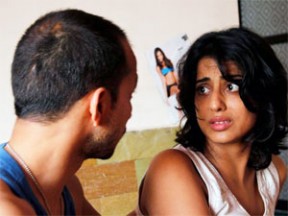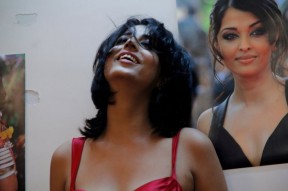The hardest thing in the world is to find a story people have not heard before. And it is easy to see why Maria Susairaj’s story would make a Ram Gopal Varma excited about a narrative that even an Anurag Kashyap, who is fast becoming the master of dysfunction and human darkness, would not be able to conceive. So yes Ram Gopal Varma’s Not A Love Story is about a murder we all have been shaken and sickened by. And yet the only thing I carried with me as I left the cinema hall was the memory of Mahi Gill’s legs and the way the camera crawls up and down their length. In one shot, it suddenly and without a context projects what I will politely call as her red satin encased cleavage. Maybe the camera is foretelling what is going to happen a few moments later. But then the camera in this film as in most RGV films, is like an unhinged mind that suddenly and inexplicably darts in dark corners.
And suddenly tilts itself to see what a car, a building, a woman looks like upside down. That suffers from an attention deficit disorder as it restlessly slams into things, people, grows fuzzy and bleary, sees things that are not there, focuses on things that have no connection with anything. For instance when Anusha (Mahi Gill) gets off a vehicle and a male acquaintance calls out to her, she swirls and we see her strappy shoes in a quick flash. Why? No idea really. Also half way through the film, RGV decides to revisit Bhoot where we saw multiple shots of a skyscrapper where the action unfolds. And so here too, the building where the actual murder took place (the film was shot in flat below Susairaj’s house where Neeraj Grover was done to death), is captured again and again and again in sharp, edgy angles with noisy sound effects.
Also many things flitted across the mind while I sat through this film. One of RGV’s most successful films ever, Rangeela to start with because in this film, he really takes us by the nose and rubs it in the contrast between a fairy tale and a real life story of ambition and murder.
Mahi Gill’s Anusha dances to the Rangeela song (it is also her caller tune and keeps interrupting her constantly) in a bare, one bedroom apartment, surrounded by tacky posters of heroines she wants to emulate. She is not wide eyed like Urmilla’s Mili who remained inviolable and innocent even though the camera lingered on body parts, tousled hair, eyes glazed with desire, quivering lips. She was objectified from a distance but here Anusha is all body which is not even portrayed with the aesthetic gloss of Rangeela. We see her knees, calves, yes her cleavage as if she has nothing more to her.
Gill is presented cleverly as a wannabe who thinks she has it but doesn’t and when you see her at a photo shoot, RGV makes all the efforts to show us that she has by industry standards, an out-of-shape body. The clothes she is posing in are tacky. That she is not star material is emphasised again and again as when her companion tells an auto driver that she is the star of tomorrow and he does not even look back to give her a second look or when a police officer asks her, “You are a heroine?” So yes, we get it, this is not another Hindi version of A Star is Born but the story of a woman caught between men who want her for different reasons. Her boyfriend Robin (Deepak Dobriyal, acting convincingly as a manic boy friend) who is obsessed with her and can’t stand it that she has a life and ambition he has no part in. And film directors and men from the industry who see in her, a burning ambition waiting to be compromised.
Maria Susairaj should not have worried about being portrayed as a conscience free co-conspirator here because the film would have us believe that she was a victim of circumstances than someone who was part of a crime where a grown man was killed in hot or cold blood, depending on your version, and chopped up to be carried away in plastic bags to his final resting place; a petrol drenched spot in Bhayandar’s jungles. Here she is a helplessly screeching by-stander who is somehow convinced to go and buy plastic bags and a meat cleaver for the final chopping of a man she was intimate with a few hours ago, borrow a car in which the bags are carried and then accompany friends of the dead man to a police station to feign concern over his disappearance.
As in most dark films made recently, there is no attempt to understand what goes through the mind of accidental murderers as they mop up the remains of the victims and go on with their lives as if nothing has happened. Yes, there is a nightmare or two but that is it. And even when a common friend of the murdered man confronts Anusha in a jail cell, there is nothing said that conveys the enormity of the crime committed.
Only one thing is established after the confrontation that what happened, was caused by the passion between Anusha and Robin. End of story. And because it was caused by passion and jealousy in the heat of the moment, we should perhaps not judge the lovers too harshly. As a background song playing loudly in the background conveys, ‘Koi khud se bura nahi hota..Pal toh kisi ka nahin hota.’ No one is bad intrinsically. But just a moment can change everything. Going by that, every murder in history can be justified. The victim Ashish (Ajay Gehi in a poignant cameo) is almost reduced to a prop while the lovers tip toe and plot their escape around him. His parents are shadowy beings. Their grief just an aside. His life, his existence just a twist in the plot, nothing more.
For a story so wrought with tragedy, there is very little emotion in the film and in the end, the story is reduced to how two rather self-serving individuals remain committed to the twisted passion they share despite what they have destroyed along the way. A few tacky lines sum it all up, “The prosecution wants them killed. Their lawyers want them to kill each other. They want to be killed together.”
Even in the end, her plea for forgiveness is not for the crime that was committed but for the lie she told her lover to save her own face when he turned up at her doorstep not knowing that there was another man in her bedroom.
This is in RGV’s own words, “a quickie,” a film made in a hurry to cash on a story before it grows cold. The performances are as solid as they can be in a film as threadbare as this and what horrifies as it ends is not what transpires but the fact that nothing horrifies us anymore.
Reema Moudgil is the author of Perfect Eight (http://www.flipkart.com/b/books/perfect-eight-reema-moudgil-book-9380032870?affid=unboxedwri )







